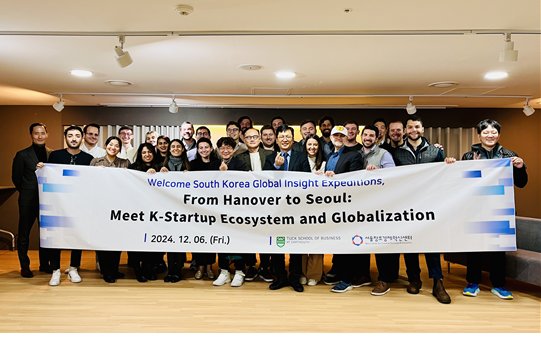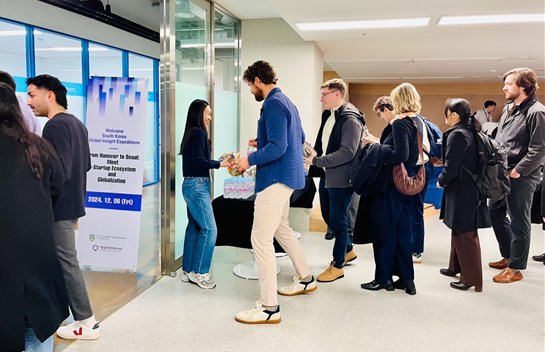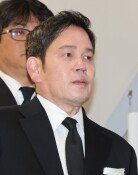Dartmouth Tuck School of Business Visits Seoul Center for Creative Economy & Innovation (SCCEI) to Foster Collaboration with Korea's Startup Ecosystem
Dartmouth Tuck School of Business Visits Seoul Center for Creative Economy & Innovation (SCCEI) to Foster Collaboration with Korea's Startup Ecosystem
Posted December. 11, 2024 13:54,
Updated December. 11, 2024 13:55
On December 6th, the Seoul Center for Creative Economy & Innovation (SCCEI), led by CEO YeongKeun Lee, hosted a delegation from Dartmouth's Tuck School of Business to introduce Korea's startup ecosystem and lay the groundwork for global collaboration.

The event, attended by Professor Laurens Debo and 30 graduate students from Tuck School, was part of the "Global Insight Expedition (GIX)" program, which brought the group to Seoul in the latter half of this year. CEO Lee had been directly engaged with the delegation since August to organize the event.
The event began with a welcoming speech from Byeonggweon Lee, Administrator of the Ministry of SMEs and Startups Seoul Regional office, highlighting public support and policies as key drivers behind Korea's rapid startup growth. Jaigeun LIM, Director of Foreign Residents and Immigration Policy Division of the Seoul Metropolitan Government, presented an overview of Seoul’s startup ecosystem, while CEO Lee discussed "30 Years of Startup Support Policy Changes." A Q&A session followed, where students exchanged diverse opinions with local experts on fostering startups and expanding globally.
Professor Laurens Debo shared his reflections, saying, "The GIX program in Seoul aims to understand the fast-paced growth of Korea through on-site visits and cultural exchange, learning not only about differences but also the similarities we share. I am grateful for the opportunity to engage directly with public officials about startup support policies and to gain valuable global insights.“
During the Q&A, students noted the differences in the definition of startups between the U.S. and Asia. One student explained, "Understanding these differences made it easier to grasp the distinction between Korea's innovative startups and traditional ones." Another remarked, "It was interesting to learn that the government has been fostering private sector venture capital growth and has created new systems, such as open innovation programs, to support and scale businesses.“
Students also found Korea's shift in policy concerning higher education and entrepreneurship insightful. "Five years ago, less than 10% of university students supported startups, with most preferring to work for large corporations. The government recognized this trend and made efforts to encourage younger generations to participate in the startup ecosystem, aiming to diversify talent from the large corporations. It was impressive to learn about the government's efforts in shifting from an agricultural to a manufacturing and electronic economy, which led to the emergence of new technologies, and now, Korea is home to 22 unicorn companies. This transformation shows Korea’s ongoing commitment to supporting startup growth.“
CEO YoungKeun Lee of SCCEI emphasized that the event provided a significant opportunity to foster global collaboration and showcase Korea’s thriving startup ecosystem. He noted, "This event allowed us to see the global vision connecting Seoul and USA and provided an opportunity to introduce the innovation center’s accumulated knowledge and systems for nurturing startups to the international delegation.“
Looking ahead, SCCEI plans to launch the Global Collabo Lab, a platform for investment-based open innovation 2.0, to proactively address the rapidly changing global startup market. The center remains committed to building the optimal ecosystem for startups at a national level and continues to work on strengthening Korea's position in the global startup scene.
By Moon-Kyoo Lee(munch@itdonga.com)


The event, attended by Professor Laurens Debo and 30 graduate students from Tuck School, was part of the "Global Insight Expedition (GIX)" program, which brought the group to Seoul in the latter half of this year. CEO Lee had been directly engaged with the delegation since August to organize the event.
The event began with a welcoming speech from Byeonggweon Lee, Administrator of the Ministry of SMEs and Startups Seoul Regional office, highlighting public support and policies as key drivers behind Korea's rapid startup growth. Jaigeun LIM, Director of Foreign Residents and Immigration Policy Division of the Seoul Metropolitan Government, presented an overview of Seoul’s startup ecosystem, while CEO Lee discussed "30 Years of Startup Support Policy Changes." A Q&A session followed, where students exchanged diverse opinions with local experts on fostering startups and expanding globally.
Professor Laurens Debo shared his reflections, saying, "The GIX program in Seoul aims to understand the fast-paced growth of Korea through on-site visits and cultural exchange, learning not only about differences but also the similarities we share. I am grateful for the opportunity to engage directly with public officials about startup support policies and to gain valuable global insights.“
During the Q&A, students noted the differences in the definition of startups between the U.S. and Asia. One student explained, "Understanding these differences made it easier to grasp the distinction between Korea's innovative startups and traditional ones." Another remarked, "It was interesting to learn that the government has been fostering private sector venture capital growth and has created new systems, such as open innovation programs, to support and scale businesses.“
Students also found Korea's shift in policy concerning higher education and entrepreneurship insightful. "Five years ago, less than 10% of university students supported startups, with most preferring to work for large corporations. The government recognized this trend and made efforts to encourage younger generations to participate in the startup ecosystem, aiming to diversify talent from the large corporations. It was impressive to learn about the government's efforts in shifting from an agricultural to a manufacturing and electronic economy, which led to the emergence of new technologies, and now, Korea is home to 22 unicorn companies. This transformation shows Korea’s ongoing commitment to supporting startup growth.“
CEO YoungKeun Lee of SCCEI emphasized that the event provided a significant opportunity to foster global collaboration and showcase Korea’s thriving startup ecosystem. He noted, "This event allowed us to see the global vision connecting Seoul and USA and provided an opportunity to introduce the innovation center’s accumulated knowledge and systems for nurturing startups to the international delegation.“
Looking ahead, SCCEI plans to launch the Global Collabo Lab, a platform for investment-based open innovation 2.0, to proactively address the rapidly changing global startup market. The center remains committed to building the optimal ecosystem for startups at a national level and continues to work on strengthening Korea's position in the global startup scene.
By Moon-Kyoo Lee(munch@itdonga.com)

Headline News
- Joint investigation headquarters asks Yoon to appear at the investigation office
- KDIC colonel: Cable ties and hoods to control NEC staff were prepared
- Results of real estate development diverged by accessibility to Gangnam
- New budget proposal reflecting Trump’s demand rejected
- Son Heung-min scores winning corner kick







